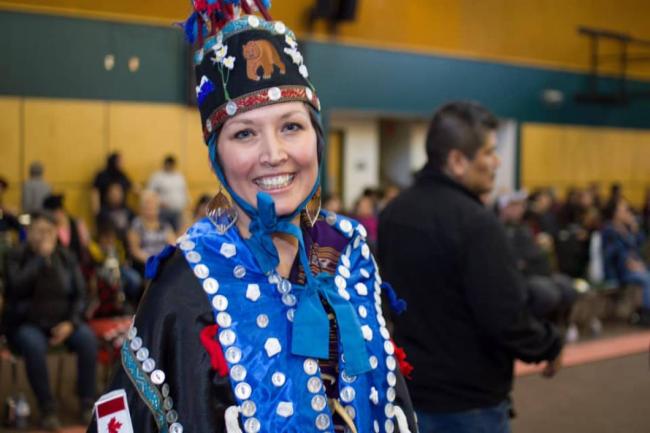Articles Menu

Sleydo', a.k.a. Molly Wickham, was among 14 people arrested at the Gidimt'en Checkpoint on January 7 when heavily armed Mounties arrived to enforce a B.C. Supreme Court injunction obtained by Coastal Gaslink Pipeline Ltd.
On December 20, the Guardian reported that the RCMP was prepared at that time to use lethal force, arrest children and grandparents, and apprehend the demonstrators' children.
"With terminology like 'lethal overwatch', 'sterilize the site', and the threat of child welfare removing our children from their homes and territory, we see the extent to which the provincial and federal governments are willing to advance the destruction of our lands and families for profit," she continued. "The state has always removed our people from our lands to ensure control over the resources. This has never changed.
"At a time when the province has introduced the UNDRIP legislation, the RCMP are occupying our territory for the sole purpose of protecting industry and ensuring extractive projects proceed unhindered."
UNDRIP is an acronym for the United Nations Declaration on the Rights of Indigenous Peoples.
Article 10 states: "Indigenous peoples shall not be forcibly removed from their lands or territories. No relocation shall take place without the free, prior and informed consent of the indigenous peoples concerned and after agreement on just and fair compensation and, where possible, with the option to return."
On May 30, 2018, Parliament passed Bill C-262, which calls for the laws of Canada to be in harmony with UNDRIP. The bill, which was sponsored by former NDP MP Romeo Saganash, has gone through a Senate committee but still hasn't received Royal Assent.
On November 28, Royal Assent was granted to a provincial law, 2019 Declaration on the Rights of Indigenous People's Act. This legislation affirms that UNDRIP applies to B.C. laws.
Coastal GasLink obtained agreements from all the elected First Nations councils along the 670-kilometre pipeline route from northeastern B.C. to the yet-to-be-built LNG Canada facility near Kitimat.
It's part of a $40-billion private-sector project that's received a green light from the federal and provincial governments.
But hereditary chiefs claim jurisdiction over their traditional territories and insist that elected chiefs and councils only have authority over reserves created under the Indian Act.
Coastal GasLink is a subsidiary of TC Energy, formerly known as TransCanada Pipelines. It's pushing forward with the Keystone XL pipeline project over the objections of Indigenous people on both sides of the U.S.-Canada border.
In 1997, hereditary Wet'suwet'en and Gitxsan chiefs won a landmark ruling in the Supreme Court of Canada when all nine judges affirmed the existence of Aboriginal title post-Confederation. The Wet'suwet'en, like most B.C. First Nations, have not signed treaties with the Crown.
In 2011, a B.C. Supreme Court ruling stated: "Each Wet'suwet'en chief has rights and responsibilities specific to the particular territory over which that chief has been given a duty to protect."
There are five Wet'suwet'en clans. Each has its own house groups. One of those clans is the Gidimt'en, which is led by Hereditary Chief Woos. Sleydo' is the Gidimt'en spokesperson.
"The facts released by the Guardian's exclusive article today to the Canadian and global public reveal the reality between Indigenous peoples protecting our lands and RCMP since contact and continuing today," Sleydo' said in her statement. "Here we are, nearly 2020, and we are still being threatened with violence, death, and the removal of our children for simply existing on our lands and following our laws."
In the Witset feast hall in December 2018, the clan announced that it was creating the checkpoint to protect its territory as well as the territory of the neighbouring Gilseyhu clan. Its members have created the Unist'ot'en Village, which it describes as an "Indigenous reoccupation of traditional territory".
According to the Guardian, RCMP commanders issued instructions that officers could "use as much violence toward the gate as you want" when taking down the blockade at the Gidimt'en Checkpoint in January.
The Gidimt'en clan called that "abhorrent".
"We want to live free on our lands, without the constant threat of violence by CIRG (Community Industry Response Group), who are illegally occupying Gidimt'en territory," Sleydo' said.
Environmental activists have launched a social media campaign expressing solidarity with the Wet'suwet'en people by using the hashtag #wouldyoushootmetoo.
[Top photo: Sleydo', a.k.a. Molly Wickham, is the spokesperson for the Gitimt'en Checkpoint.CARLA LEWIS PHOTOGRAPHY/WET'SUWET'EN ACCESS POINT]